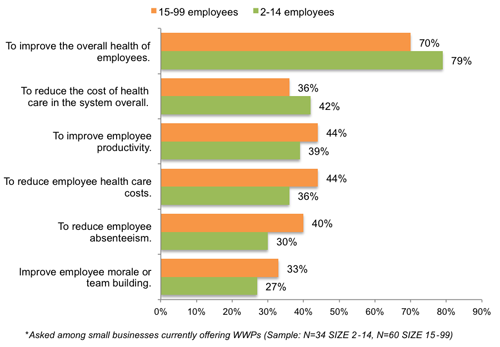Small Business Attitudes on Wellness Programs
Although large employers have been expanding wellness programs in recent years, small businesses have lagged in this endeavor. Since small businesses employ nearly 50% of all private-sector workers, any comprehensive expansion of wellness and prevention efforts must include a role for this large swath of private sector employers.
Wellness programs have the ability to help small employers boost productivity, reduce absenteeism, lower healthcare premiums and offer more benefits to their employees. Small Business Majority conducted extensive research into the challenges small businesses face in adopting workplace wellness programs, and uncovering potential solutions to those challenges. We also endeavored to identify workplace wellness program components that small businesses would like and use.
The broad results of our research are promising. They indicate that small business owners are truly interested in workplace wellness programs.
Key Findings
There is significant potential to expand workplace wellness programs to a large share of the small business community.
Those with programs in place find they are highly effective and beneficial to both their business and their workers. But in order to encourage more small employers to implement wellness programs, they first need easy access to information about these programs.
Since two of the largest obstacles facing small businesses are time and money, it’s vital they have options that are easy to implement and make sense for their specific businesses and their employees.
Proper messaging about these programs is crucial. Focusing the discussion about their impact on employees and highlighting reduced absenteeism and increased productivity offer the best opportunity to spread the message about the importance of wellness programs to small business owners.
Entrepreneurs also look to their peers on issues like these, and relaying the success of other small businesses is vital to increasing participation in these programs.

